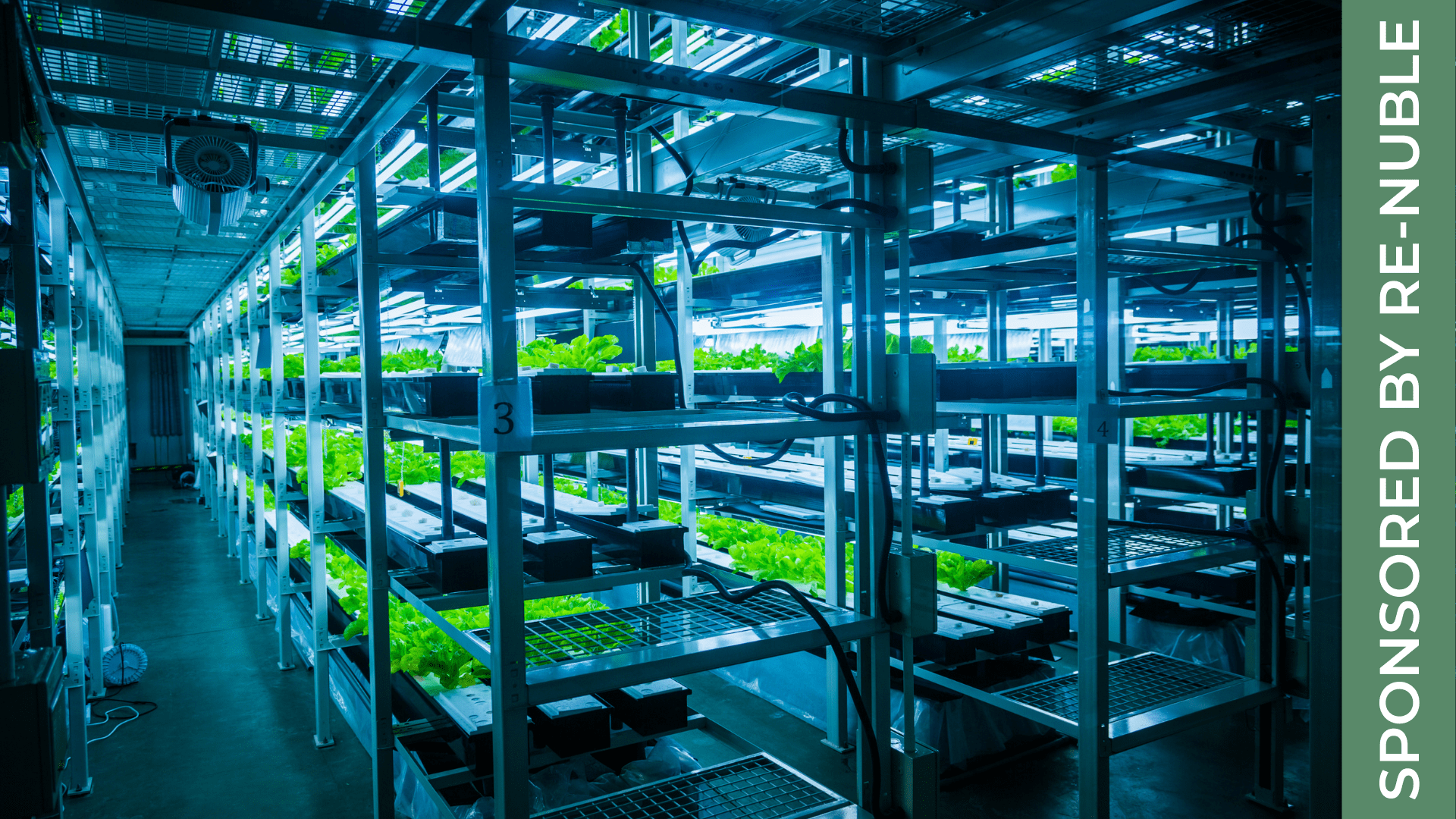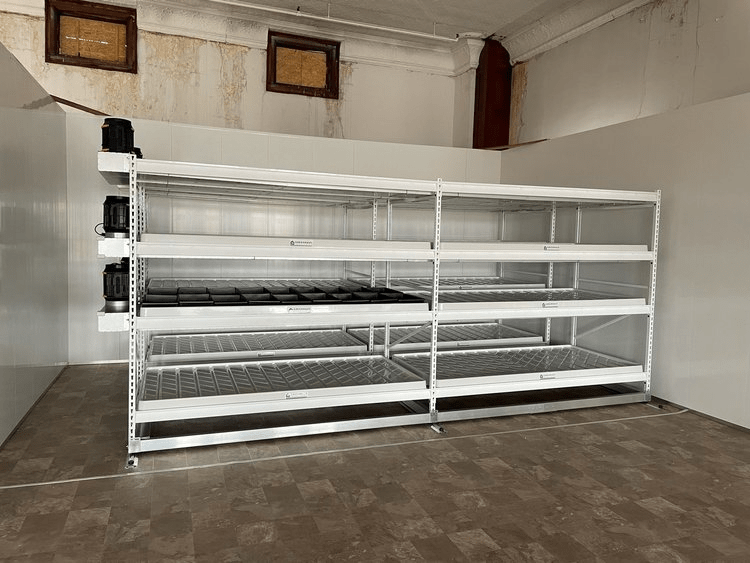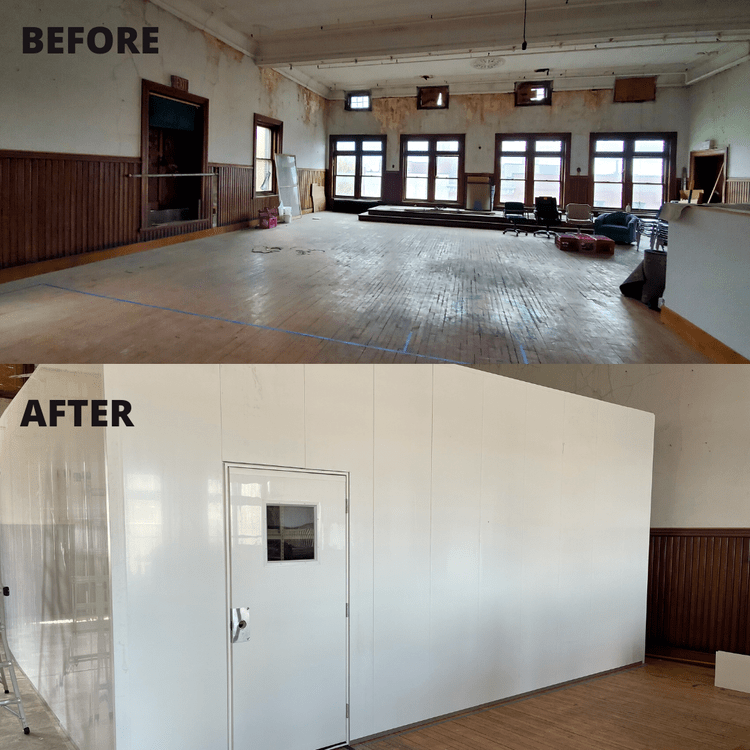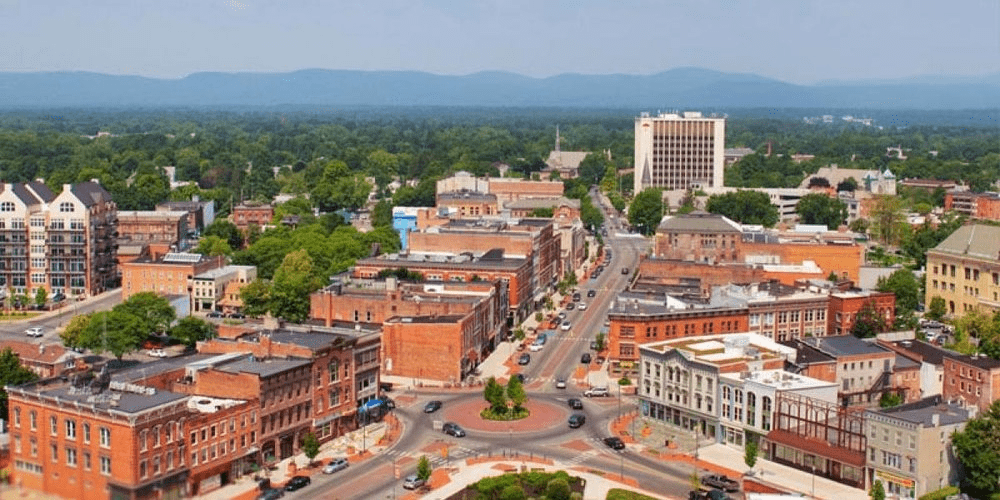Apr 27, 2022
This Pilot Project Aims To Make Closed-Loop Vertical Farming An Everyday Reality

Editor’s Note: This is the first post of a series in partnership with AgTech startup Re-Nuble on an innovative project launching in the city of Glens Falls, New York. It includes information derived from an interview between Agritecture and members of the Re-Nuble team: Tinia Pina, Founder & CEO, Riyana Zafira Razalee, Head Of Business Development & Strategy, and Josh Fabian, Project Farm Manager.
For centuries, urbanization has been paired with human development and economic progress. But, as globalization intensified over the last half-century, we’ve witnessed many cities lose the small businesses that created local economic prosperity, most commonly in the manufacturing sector. A similar pattern took hold in the food production sector, as diversified family farms near urban centers could no longer compete with hyper-specialized industrial farms and the efficiency of global supply chains.
Combine the two phenomena, and today, we find many cities with struggling local economies, an excess of vacant industrial buildings, and a lack of control over their food supply.
As such, we now see many cities around the world embracing urban agriculture and vertical farming as a means of combating these challenging economic headwinds. And while there are countless benefits to localized production via vertical farming, there are still many challenges when it comes to deploying vertical farms at such a scale where they could make a meaningful difference to local economies.

Setting up the vertical farming system on-site in the City of Glens Falls; image sourced from Re-Nuble
These include: high initial start-up costs that often dissuade entrepreneurs and investors, high energy use that poses financial and environmental drawbacks, a reliance on mined inputs from distant sources such as fertilizers, and a lack of experienced indoor farm managers.
What if we could create a replicable vertical farming model in which data was collected from all activities and published openly to transparently showcase benefits and areas for improvement?
Closed-loop agriculture expert Re-Nuble has recently partnered up with the forward-thinking City of Glens Falls, New York, to do precisely this. In collaboration with multiple technology and utilty and service providers, the team is set to launch a 12-month long pilot that will serve as a closed-loop vertical farming model.
Re-Nuble’s Founder & CEO, Tinia Pina, shares that “our 480-square foot vertical farm will provide a modular, scalable model for growing year-round crops using Re-Nuble’s closed-loop agriculture methods in northern climates, while also keeping the food stream local. At the same time, we will be able to help contribute to Governor Hochuls’ (the 57th governor of New York) 2022 Nourish NY and Health Communities goals for 2022.”
“This project was an opportunity to be directly involved from design to operation for a hyper-localized food production system. It is truly a dream coming to fruition each and every day. ”
This project will prove how organic and closed-loop agriculture is possible using upcycled hydroponic nutrients and fully compostable, inert grow media:
-
Re-Nuble’s Away We Grow organic hyroponic nutrients sources water-soluble sterilized vegetative waste to remove 18.75 pounds of CO2e (carbon dioxide equivalent) for every gallon
-
Their revamped ReNu Terra fully-compostable, chitin-based and inert, grow media will additionally aid this first-of-its-kind project whilst removing grow media from landfills without compromising sterility, uniformity, water retention and drainage
Alone, each of these individual solutions helps indoor farms (e.g. greenhouses, vertical farms) be more circular in their processes. But, together, they uncover cost reductions while optimizing operations for farmers. In doing so, they create a fully integrated, closed-loop, and self-sustaining nutrient system that reduces input and disposal costs.
“In a world where soil depletion is happening right before our eyes, indoor growers have stepped up to lessen the burden on food systems, especially as soil-based farmers race to reverse the climate crisis. What this clearly shows is that collective action is crucial. This stands true with the Glens Falls Urban Agriculture Project (UAP). Not only are we growing the closed-loop agriculture movement within the controlled environment agriculture (CEA) industry, but we’re also removing silos and barriers, while reducing any environmentally exhaustive indoor farming practices. We then make it as easy as possible for other growers to replicate this, and to then educate and empower their own customers when purchasing food. As the saying goes: It takes a village. ”
“The Glens Falls UAP is an example of how individualized growing systems can be, and plays a vital role not only in feeding our community but also in the growing field of individualized nutrition. It’s exciting to me that the Glens Falls UAP’s partnership with Re-Nuble opens the realm of possibilities to hybridize the organic definition and set new benchmarks in indoor vertical growing systems. By utilizing the trade-marked Re-Nuble products, it brings Glens Falls UAP into a closed loop food system. This then contributes to exploring, and perhaps setting another benchmark in defining nutritional density of agricultural food products for human (and animal) wellness and health restoration. ”
The self-contained, easily replicable, transferable vertical farming system will further demonstrate the potential for revitalizing local, distressed, and underutilized properties.

Before and after shots of the site in Glens Falls; images sourced from Re-Nuble
The primary goals of this project are to collect and share the insights obtained based on data collected (e.g. financial, yield productivity, etc.) and use this to create a replicable business model for others that are considering the same opportunity.
By sharing a model that is easily adapted to various sizes and styles of buildings with minimal alteration, the project will offer communities throughout New York State an alternative way to use long-abandoned buildings and structures.
When put into context, based on the real estate market in December 2021, we see that there are over 108 properties in New York City that “are at least an acre in size, a typical vertical farm size, that are vacant and/or distressed. These properties amount to a total area of 40,251,618 square feet of unused lot size. Based on our model, if we were to fill up all 108 of these properties with vertical farms, it would result in over $350,000,000 in revenue per year, approximately $110,000 in annual employee income, as well as approximately 2,500 full-time jobs for the New York State,” shares Pina.
This template for urban farms will thus create more equitable opportunities in the booming industry, generating tech-forward and green recovery employment opportunities for a changing workforce. And, for cities, it will enable them to pursue a green path of recovery as they navigate this post-COVID period of economic transition.
“In an industry that relies heavily on environmentally-exhaustive practices such as the mining of rockwool and synthetic mineral salts, Re-Nuble has taken its eight years of experience to spearhead closed-loop indoor farming innovations - transforming unrecoverable food byproducts into water-soluble organic hydroponic nutrients and grow substrates,” shares Agritecture’s Consultant, Sarah Janjua.

Image of downtown Glens Falls; image sourced from the Warren County Tourism Department
The City of Glens Falls sets the perfect scene for this industry-changing project.
As the first Capital Region recipient of the $10 million NYS Downtown Revitalization Initiative (DRI), the City has been actively working to create opportunity to expand their “locavorian” (participants in the local food movement) footprint. Notable projects include a Market on South Street, a year round farmer’s market and community center, and relocating the SUNY Adirondack Culinary School to a downtown space nearby.
Glens Falls has been hard at work, reinventing itself as the commercial, cultural, and innovation gateway to the Adirondack region. Jeffrey Flagg, Glens Falls’ Economic Development Director, adds that “we have an opportunity in front of us to leverage agricultural development through public-private partnerships, a reflection of cities such as Glens Falls that are looking for innovative ways to create new economy, green recovery jobs.”
The project is being supported by sustainability expertise from a select team of agriculture professionals and external research consultants.

Logos of the partners involved in this project
Convening these bright minds will bring more data transparency and innovation to the industry, moving the needle on modular CEA operations:
-
Empire State Development Corporation, partial backer of the UAP project;
-
National Grid, one of the largest investor-owned energy companies in the US;
-
Pipp, a leading provider of movable vertical growing solutions;
-
Fluence by OSRAM, a leading global provider of energy-efficient LED lighting solutions for commercial food and cannabis production;
-
Abbott Energy, an engineering contractor serving municipal, commercial and industrial clients;
-
Nuravine, an advanced nutrient dosing system for recirculating hydroponics;
-
Nordetect, a real-time nutrient analysis product with cloud-connected hardware and accessible software;
-
FarmTech Society, consultancy aiding with the development and implementation of technologies for indoor growing;
-
Sustainable PR, green-focused public relations agency;
-
And, Agritecture, an advisory services provider in the design, planning, implementation, and operation of urban agriculture projects.
“This project allows for us to show that building a business as a community is possible. We are truly grateful to have the help of local Glens Falls constituents come together to ensure that impact could be made as it relates to developing a local workforce, measuring for and holding us accountable for potential increased nutritional composition, and optimizing for sustainability. New York state and the city of Glens Falls, amongst everyone listed, couldn’t be better partners on the team as we are all unquestionably committed to seeing access to this model become more accessible to non-urban regions. The time for more data transparency, collaboration within the industry, and, more importantly, accessible education is overdue and we’re hoping to catalyze that with this project. ”
“Agritecture believes deeply in the role that data transparency will play in furthering the CEA industry, and as such we’re thrilled to be part of this innovative project by helping to gather and benchmark data on the farm’s carbon footprint. ”
“Closed-loop agriculture is a hot word when it comes to vertical farming, but very difficult to achieve. Recycling waste products into usable nutrients is a big leap in closing that gap. As a dosing company, we are grateful that Re-Nuble has developed organic fertilizer that also runs clean. This technology is important today and will become more of a necessity in the years to come. We are happy to be a part of this project at Glens Falls. ”


